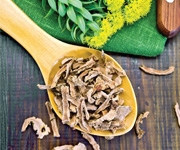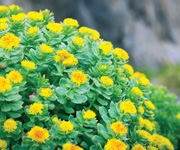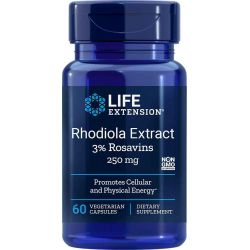RHODIOLA Combats “Burnout” Syndrome
 Burnout is real.
Burnout is real.In May 2019, the World Health Organization officially included it in its International Classification of Diseases.
This recognition confirmed that burnout was not a figment of the imagination, or something suffered only by “weak” or “unmotivated” people.1
Medical treatments are limited. The Mayo Clinic recommends sleep and relaxation.2
But now there’s hope for the 30% to 72% of working people who suffer from burnout syndrome.3,4
In a recent, human trial, patients who took an extract of the herb Rhodiola had deep reductions in burnout symptoms in just one week.
That included a decrease in feelings of overload, tension, fatigue, and overall stress.
At the same time, Rhodiola led to improvements in high-level cognition and decision-making.5
This recent clinical trial plus prior studies show this low-cost plant extract provides a much-needed approach to burnout syndrome, which may encompass many aspects of normal aging.
The Truth About Burnout
 Workplace stress is increasing around the world.6
Workplace stress is increasing around the world.6The combination of work-related pressure, fatigue, and exhaustion has long been referred to, informally, as burnout. But until 2019, it had no official definition.
That changed with the recognition of occupational burnout, in the newest version of the International Classification of Diseases, as “a syndrome…resulting from chronic workplace stress that has not been successfully managed.”1
- Feelings of low energy or exhaustion,
- Increased mental “distance” from one’s job, or feelings of negativity or cynicism about the job, and
- Reduced professional efficacy (the ability to get a job done well).
Practically every working person is at risk for burnout. Rates run from 30% in teachers and medical students to as high as 72% among some highly-stressed professionals.3,4,6
But because burnout wasn’t even considered a real syndrome until recently, few treatments were available.
 Burnout is marked by feelings of workplace stress, frustration, and job dissatisfaction.
Burnout is marked by feelings of workplace stress, frustration, and job dissatisfaction.- A new study shows that an extract of the herb Rhodiola rosea, long used to relieve stress, safely and effectively reduces the symptoms of burnout.
- People with burnout who took 200 mg of Rhodiola extract twice daily felt less tense and exhausted, and performed better on tests of executive function.
- Rhodiola extract is approved for stress relief by the European Committee on Herbal Medicinal Products and is an ideal therapeutic intervention for stress-related burnout.
What Is Rhodiola?
 Rhodiola rosea is an herb that grows in cold, mountainous regions of Europe and Asia.
Rhodiola rosea is an herb that grows in cold, mountainous regions of Europe and Asia.Its roots are rich in beneficial compounds, including a group of substances with a wide variety of health benefits called phenylpropanoids. These include rosavin, rosin, and rosarin, that are found only in Rhodiola.5
Rhodiola root is known as an adaptogen, a plant that helps the body adapt to and resist physical, environmental, and oxidative stress.5,7
Dried Rhodiola extract has been used for centuries to relieve stress and reduce fatigue.5,8,9
Unlike drugs that stimulate the central nervous system, Rhodiola can enhance performance without a later “crash,” or loss of work capacity.10-12 Indeed, Rhodiola provides both emotional stabilization and mental stimulation.
Rhodiola Relieves Burnout

Burnout is brought on and exacerbated by stress. Because Rhodiola contains proven anti-stress properties,9,13-15 researchers decided to test whether it could relieve burnout syndrome.5
In a first-ever clinical trial exploring the impact of Rhodiola on burnout, Austrian researchers enrolled outpatients aged 30-60 who suffered from burnout symptoms.5
Patients were given 200 mg of Rhodiola extract twice daily for three months. The 68 subjects who completed the study were assessed before starting, again on day seven, and at weeks four, eight, and 12.5 The study showed significant decreases in scores on a standard burnout measure over the course of the study.5
Self-reported symptoms of stress fell sharply in all seven categories measured, with the steepest decline in the first week of the study.
On a Perceived Stress Questionnaire, subjects showed significant improvement in all of the following categories:5
Significant improvements were also seen in sex life and on a Patient Sexual Function Questionnaire, including ability to become aroused, frequency of sexual activity, ability to reach orgasm, and overall satisfaction with sex life.5
These findings are vital for sufferers of burnout, whose sexual enjoyment is often impaired, leading to more stress.16
Unlike anti-anxiety medications that can leave users with confusion or trouble concentrating, Rhodiola extract led to significant improvements on a test that assessed executive function (high-level cognition, decision-making, and sorting), that is impaired by burnout.17
It also boosted overall mood, including feelings of alertness and calmness.5
Reducing Stress

A study showed for the first time that Rhodiola extract can ease the symptoms of burnout.
Many past studies have demonstrated that Rhodiola is an effective stress reliever.
Stress is a reaction to external threats or pressures, marked by symptoms of exhaustion, energy loss, irritability, and tension.9 Untreated chronic stress underlies burnout.
Most anti-anxiety drugs come with undesirable side effects and potential for addiction. But studies conducted over the past decade have established that Rhodiola has an excellent safety profile, with no serious side effects of any kind.5,9,18
Rhodiola rosea, an adaptogen approved by European authorities for use in stress, has been shown to be effective in reducing its symptoms.
In fact, because of its documented ability to safely reduce the release of stress hormones like cortisol, while also boosting energy,9,12,19 Rhodiola is now the main adaptogen approved for stress relief by the European Medicines Agency’s Committee on Herbal Medicinal Products.
One clinical study revealed that doses of 200 mg twice daily result in a significant reduction in stress symptoms.18 In another study, Rhodiola extract significantly reduced stress-related fatigue while increasing mental performance, especially the ability to concentrate.19
Summary

Burnout has officially been included by the World Health Organization in its International Classification of Diseases.
An extract of the herb Rhodiola rosea, an adaptogen approved by European authorities for use in stress, has been shown to be effective in reducing its symptoms.
People who took 200 mg of Rhodiola extract twice daily for three months experienced improvements in all three main symptoms of burnout: exhaustion, cynicism, and lack of efficacy.
Rhodiola’s burnout-fighting properties are tied to its ability to lower stress, which may be due in part to its ability to decrease excessive levels of the stress hormone cortisol.
In the recent study of burnout and Rhodiola, subjects also saw improvements in how well their brains functioned.
People feeling stressed and burned out now have hope, because this natural plant extract has been proven to help.
Material used with permission of Life Extension®. All rights reserved.
-
World Health Organization (WHO). International Statistical Classification of Diseases and Related Health Problems (ICD) 11. QD85 Burn-out. Geneva: WHO; 2019.
-
Available at: https://www.mayoclinic.org/healthy-lifestyle/adult-health/in-depth/burnout/art-20046642. Accessed July 23, 2019.
-
Gomez-Urquiza JL, De la Fuente-Solana EI, Albendin-Garcia L, et al. Prevalence of Burnout Syndrome in Emergency Nurses: A Meta-Analysis. Crit Care Nurse.2017 Oct;37(5):e1-e9.
-
Rotenstein LS, Torre M, Ramos MA, et al. Prevalence of Burnout Among Physicians: A Systematic Review. JAMA. 2018 Sep 18;320(11):1131-50.
-
Kasper S, Dienel A. Multicenter, open-label, exploratory clinical trial with Rhodiola rosea extract in patients suffering from burnout symptoms. Neuropsychiatr Dis Treat. 2017;13:889-98.
-
Heinemann LV, Heinemann TH. Burnout Research: Emergence and Scientific Investigation of a Contested Diagnosis. SAGE Open. 2017 January-March:1-12.
-
Kelly GS. Rhodiola rosea: a possible plant adaptogen. Altern Med Rev. 2001 Jun;6(3):293-302.
-
Selye H. The general adaptation syndrome and the diseases of adaptation. J Clin Endocrinol Metab. 1946 Feb;6:117-230.
-
Anghelescu IG, Edwards D, Seifritz E, et al. Stress management and the role of Rhodiola rosea: a review. Int J Psychiatry Clin Pract. 2018 Nov;22(4):242-52.
-
Panossian A, Wagner H. Stimulating effect of adaptogens: an overview with particular reference to their efficacy following single dose administration. Phytother Res. 2005 Oct;19(10):819-38.
-
Brekhman, II, Dardymov IV. New substances of plant origin which increase nonspecific resistance. Annu Rev Pharmacol. 1969;9:419-30.
-
Panossian A, Wikman G, Sarris J. Rosenroot (Rhodiola rosea): traditional use, chemical composition, pharmacology and clinical efficacy. Phytomedicine. 2010 Jun;17(7):481-93.
-
Li Y, Pham V, Bui M, et al. Rhodiola rosea L.: an herb with anti-stress, anti-aging, and immunostimulating properties for cancer chemoprevention. Curr Pharmacol Rep. 2017 Dec;3(6):384-95.
-
Ross SM. Rhodiola rosea (SHR-5), Part I: a proprietary root extract of Rhodiola rosea is found to be effective in the treatment of stress-related fatigue. Holist Nurs Pract. 2014 Mar-Apr;28(2):149-54.
-
Spasov AA, Wikman GK, Mandrikov VB, et al. A double-blind, placebo-controlled pilot study of the stimulating and adaptogenic effect of Rhodiola rosea SHR-5 extract on the fatigue of students caused by stress during an examination period with a repeated low-dose regimen. Phytomedicine. 2000 Apr;7(2):85-9.
-
Stulhofer A, Traeen B, Carvalheira A. Job-related strain and sexual health difficulties among heterosexual men from three European countries: the role of culture and emotional support. J Sex Med. 2013 Mar;10(3):747-56.
-
Gajewski PD, Boden S, Freude G, et al. Executive control, ERP and pro-inflammatory activity in emotionally exhausted middle-aged employees. Comparison between subclinical burnout and mild to moderate depression. Psychoneuroendocrinology. 2017 Dec;86:176-86.
-
Edwards D, Heufelder A, Zimmermann A. Therapeutic effects and safety of Rhodiola rosea extract WS(R) 1375 in subjects with life-stress symptoms--results of an open-label study. Phytother Res. 2012 Aug;26(8):1220-5.
-
Olsson EM, von Scheele B, Panossian AG. A randomised, double-blind, placebo-controlled, parallel-group study of the standardised extract shr-5 of the roots of Rhodiola rosea in the treatment of subjects with stress-related fatigue. Planta Med. 2009 Feb;75(2):105-12.


